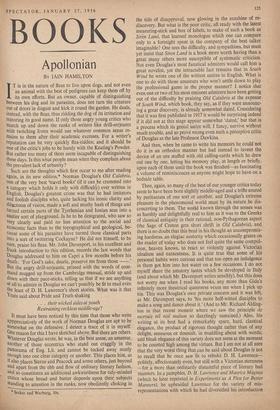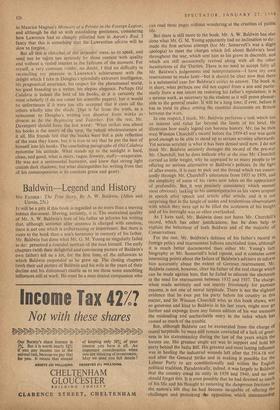BOOKS
Apollonian
BY IAIN HAMILTON IT is in the nature of fleas to live upon dogs, and not even ' an animal with the best of pedigrees can keep them off by its own efforts. But an owner, capable of distinguishing between his dog and its parasites, does not turn the creature out of doors in disgust and kick it round the garden. He deals, instead, with the fleas, thus ridding the dog of its irritation and restoring its good name. If only those angry young critics who march up and down the ranks of writers like drill-serjeants With twitching livers would use whatever common sense re- mains to them after their academic excesses. For a writer's reputation can be very quickly flea-ridden; and it should be one of the critic's jobs to be handy with the Keating's Powder. But rather too many of them seem incapable of distinguishing these days. Is this what people mean when they complain about the prevalent lack of urbanity?
Such are the thoughts which first occur to me after reading again, in its new edition,* Norman Douglas's Old Calabria, one of the very best `travel books' (if it can *be crammed into a category which holds it only with difficulty) ever written in English. Douglas's greatest crime was that he had imitators and foolish disciples who, quite lacking his ironic clarity and directness of vision, made a soft and mushy hash of things and turned certain parts of the Tyrrhenian and Ionian seas into a nastier sort of playground. Is he to be denigrated, who saw so Very clearly and paid no less attention to the social and economic facts than to the topographical and geological, be- cause some of his parasites have turned those classical parts into a 'sort of twittering Cockayne? He did not himself, to be Sure, praise his fleas. Mr. John Davenport, in his excellent and frank introduction to this edition, records the last words that Douglas addressed to him on Capri a few months before his death ; `For God's sake, dearie, preserve me from those ---_, But the angry drill-serjeants, primed with the words of com- mand mugged up from the Cambridge manual, stride up and down with their pace-sticks, telling us that if we see anything at all to admire in Douglas we can't possibly be fit to read even the least of D. H. Lawrence's short stories. What was it that Yeats said about Pride and Truth shaking . . . their wicked sides at youth Restraining reckless middle-age?
It must have been noticed by this time that those who write apppreciatively of the work of Norman Douglas are apt to be Somewhat on the defensive. I detect a trace of it in myself. One reason for this I have sketched above. But there are others. Whatever Douglas wrote, he was, in the best sense, an amateur, another of those eccentrics who stand out craggily in the Panorama of Eng. Lit. and cannot be tucked away neatly enough into one clear category or another. This places him, as it also places Sterne and Peacock and some others, just beyond and apart from the ebb and flow of ordinary literary fashion, and so constitutes an additional awkwardness for tidy-minded critics whose bread and butter depends upon their subjects standing to attention in the ranks, now obediently choking in * Seeker and Warburg, 30s. the tide of disapproval, now glowing in the sunshine of re- discovery. But what is the poor critic, all ready with the latest measuring-stick and box of labels, to make of such a book as Siren Land, that learned monologue which one can compare only to a fortnight spent in the company of the best talker imaginable? One sees the difficulty, and sympathises, but must yet insist that Siren Land is a book more worth having than a great many others more susceptible of systematic criticism. Not even Douglas's most fanatical admirers would call him a great novelist, yet the intractable fact remains that in South Wind he wrote one of the wittiest satires in English. What is one to do with those amateurs who won't settle down to play the professional game in the proper manner? I notice that even one or two of his most eminent admirers have been getting out of the difficulty by praising Old Calabria at the expense of South Wind, which book, they say, as if they were announc- ing a great discovery, is already somewhat dated. Considering that it was first published in 1917 it would be surprising indeed if it did not at this stage appear somewhat `dated,' but that is a process which its genial satire will, I fancy, survive without much trouble, and so prove wrong even such a perceptive critic of Douglas as the late Professor Dawkins.
And then, when he came to write his memoirs he could not do it in an orthodox manner but had instead to invent the device of an urn stuffed with old calling-cards which he drew out one by one, letting his memory play, at length or briefly, upon each of them until the book was finished—as fascinating a volume of reminiscences as anyone might hope to have on a bedside table.
Then, again, so many of the best of our younger critics today seem to have been born slightly middle-aged and a trifle soured by puritanism of one sort or another, and Douglas's extreme pleasure in the phenomenal world must by its nature be dis- concerting to them. The world known through the senses was as harshly and delightfully real to him as it was to the Greeks of classical antiquity in their rational, non-Pythagorean aspect (the Sage of Croton gets short shrift in Old Calabria), and there is no doubt that this bred in his thought an uncompromis- ing hardness, an elegiac austerity which occasionally grates on the reader of today who does not feel quite the same compul- sion, heaven knows, to react so violently against Victorian idealism and earnestness. It is quite true that some of his personal habits were curious and that too open an indulgence in them got him into hot water on a few occasions. I do not myself share the amatory tastes which he developed in Italy (and about which Mr. Davenport writes sensibly), but this does not worry me when I read his books, any more than Gide's infinitely more theatrical queerness vexes me when 1 pick up his. This was Douglas's own private concern and it was left, as Mr. Davenport says, to 'his more half-witted disciples to make a song and dance about it.' (And to Mr. Richard Alding- ton in that recent memoir where we saw the principle de mortuis nil nisi malum so dazzlingly sustained.) Also, his writing at its best had a remarkably spare, hard, classical elegance, the product of rigorous thought rather than of any delight, sensuous or donnish. in muddling about with words; and bleak elegance of this variety does not seem at the moment to be counted high among the virtues. But I am not at all sure that the very worst thing that can be said about Douglas is not to recall that he once saw fit to rebuke D. H. Lawrence— politely, affectionately even, but still with a Victorian sternness —for a more than ordinarily distasteful piece of literary bad manners. In a pamphlet, D. H. Lawrence and Maurice Magnus (which he later reprinted in Experiments as A Plea for Better Manners), he upbraided Lawrence for the variety of mis- representations with which he had diversified his introduction to Maurice Magnus's Memoirs of a Private in the Foreign Legion; and although he did so with astonishing gentleness, considering how Lawrence had so cheaply pilloried him in Aaron's Rod, I fancy that this is something that the Lawrentian aficiOn will be slow to forgive.
But all this is chit-chat of the scrjeants' mess, so to speak, and need not be talcen too seriously by those content with quality and without a vested interest in the fashions of the moment. For myself, a very common reader, no doubt, 1 find no difficulty in reconciling my pleasure in Lawrence's achievement with the delight which I take in Douglas's splendidly extrovert intelligence, his pragmatical assurance, his respect for the phenomenal world, his good breeding as a writer, his elegiac elegance. Perhaps Old Calabria is indeed the best of his books, as it is certainly the most scholarly (I do not count his scientific papers); but it would be unfortunate if it were too idly accepted that it casts all the others wholly into the shade. That is far from the truth, as a newcomer to Douglas's writing can discover from works as diverse as In the Beginning and Together. For the rest, Mr. Davenport should have the last word: 'What strikes one about his books is the sanity of the tone, the robust wholesomeness of it all. His friends felt that the books were but a pale reflection of the man they knew, but it is true to say that he put the best of himself into his books. The concluding paragraphs of Old Calabria epitomise his attitude. What stands up to the sunlight is hard, clean, and good; what is misty, vague, frowSty, stuffy—evaporates. He was not a sentimental humanist, and knew that strong light creates dark shadows; but what distinguishes his writing from that of his contemporaries is its constant grace and gaiety.'











































 Previous page
Previous page